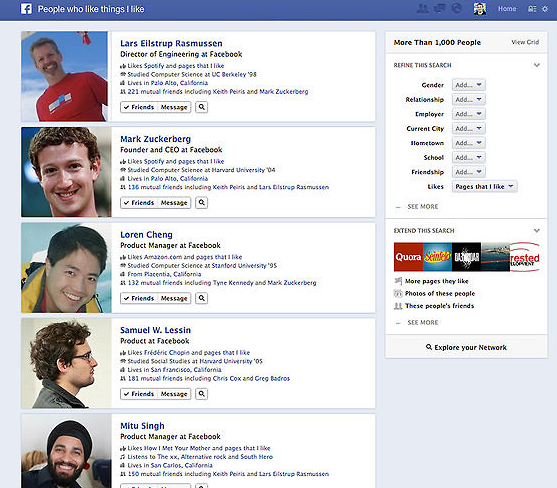There’s a new search engine in town.
As online technology spins intricate webs of capability, catering to uses both corporate and individual, testing daily the bounds of design and usability while arranging opportunities for users (and advertisers) to gain footing in a still-evolving frontier, it’s easy to get caught up in the glamour of little things. While a recipe on Pinterest makes our day, and an old co-worker provides an opportunity on LinkedIn, or we spy a groovy bar scape through the eyes of an attractive Instagram filter, how easily we forget that there are giants doing battle for the lion’s share of our clicks.
Titans of industry, echoing the likes of Rockefeller and Carnegie, are vying for the top spot. Their names are Facebook and Google, and Facebook just took a big swing.
Facebook recently unveiled a new tool for users – Graph Search. This new capability, described by Facebook CEO Mark Zuckerberg as the site’s “third pillar” next to News Feed and Timeline, is designed to allow users to step up their web searching, combining people, places, photos and interests (and promising to expand to all content), all without testing privacy issues. Facebook and privacy, a feud rivaling the Hatfields and McCoys, will no doubt be an issue once again.
But despite Facebook’s re-re-reiterating its claim that privacy settings are of utmost importance, the new tool will provide internet users with something Google search simply will not: connecting based on user information. Why ask Google where the nearest Pizza Hut is when you will now be able to ask Facebook which pizza restaurant your friends like the most – maybe even search a picture of them there. Unlike Google search which relies on keywords, according to Bloomberg.com, Graph Search will allow users to combine phrases. Gone could be the days of depending on “coffee shop” to get your caffeine boost – why not enter “Starbucks in LA that my friends like”? In the instance that Graph Search falls short, Facebook has hired Microsoft’s Bing to pick up the slack. Zuckerberg was apparently unable to reach an agreement with Google.
The new search tool has the capability to further monetize the site’s functions, providing more targeted data to drive advertising dollars that investors grow weary of waiting around for. And from a marketing standpoint, the implications are significant.
Businesses have call to take a look at their online presence, particularly as it relates to involvement in Facebook’s open graph. Individuals may no longer be searching for a restaurant, or even just a restaurant in, let’s say Chicago. They could potentially search for a restaurant, in Chicago, at a certain price level, where a certain number of certain types of people have checked in. With social search, there would be no limit to specifying connection search criteria. And for marketers, those “friends” are important to track.
Opportunities for Social-Savvy Market Researchers?
Graph Search could mirror the implications for user activity with opportunities for market research. For example, a Brand Social Media or Community Manage could potentially apply brand segmentation criteria definitions within graph search to identify potential brand advocates/loyalists, opinion leaders, potential customers, etc., on Facebook and use these search results to dig deeper into who these individuals are. In addition to uncovering new insights, the same segmentation concept can be applied to identify and target content to these segments including marketing campaigns, promotions, rewards, online surveys and even use the search results to assist in market research recruitment by contacting individuals directly. For example, search results could be used to segment, target and invite people to participate in online research panels, market research online communities, online or in-person focus groups and other ad-hoc research studies.

So while Zuckerberg is confident that “Graph Search is a completely new way for people to get information on Facebook,” it’s worth noting that the information could potentially produce measurable, usable data for advertisers and researchers.
Graph Search is a potential 3-fold win for the social networking giant, as the mouths of users, investors and advertisers curl into a wry smile.
If you are interested in signing up for the “Graph Search Beta” you can sign up here:
Will your browsing habits navigate to Graph Search? Let us know in the comment section below.



